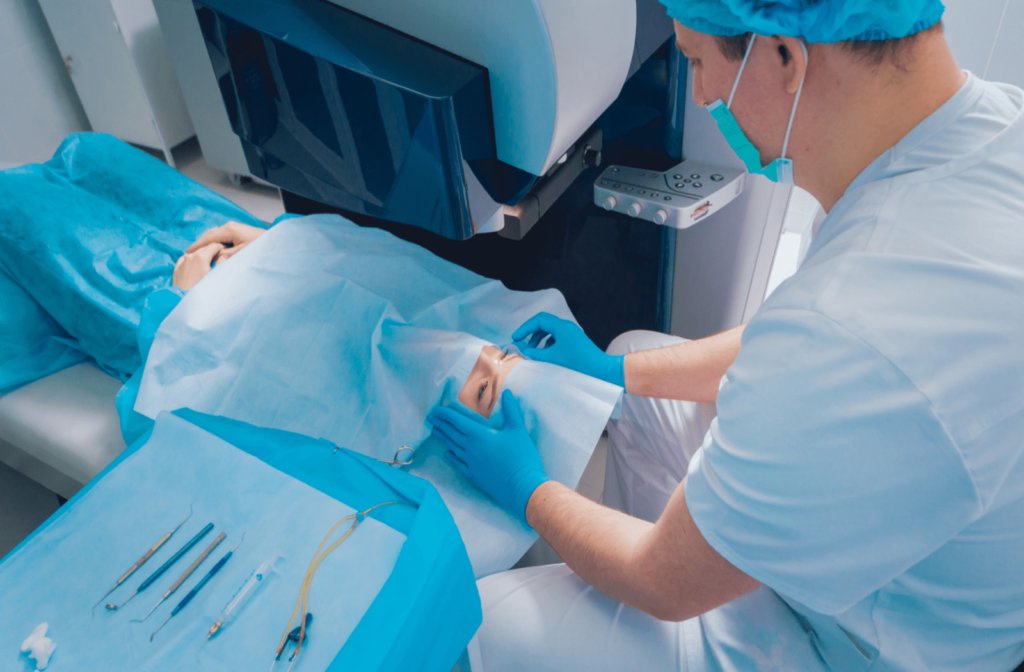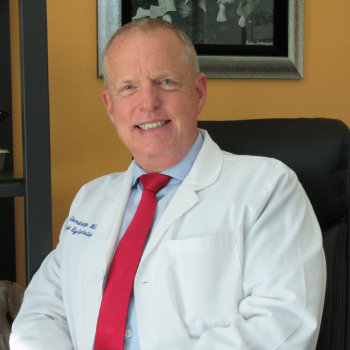Laser eye surgery can be an effective way to get the vision correction you want and stop relying on eyeglasses and contact lenses. Understanding how laser eye surgery works and what to expect after surgery is essential to get the best outcome.
Laser Eye Surgery Explained
Eye care professionals perform laser eye surgery to provide long-term correction for refractive errors. Laser eye surgery can correct nearsightedness (myopia), farsightedness (hyperopia), and astigmatism.
Irregularly-shaped corneas cause refractive errors. When light enters your eye, the cornea refracts the light to focus on your lens, which then directs it toward the light-sensitive back of your eye called the retina.
If your cornea is not shaped correctly, like being elongated\ in the case of myopia, light does not correctly enter the eye and therefore doesn’t hit the retina accurately. Refractive errors can result in blurry vision at different distances. Most people rely on glasses or contact lenses to correct their vision.
Laser eye surgery allows your surgeon to precisely reshape your cornea to correct a refractive error, provide you with clearer vision, and eliminate your need for glasses or contact lenses. Not everybody is a candidate for laser eye surgery, but your doctor can examine your eyes to determine if you are.
Possible Complications
While laser eye surgery is generally considered safe and effective, there are certain risks. These risks are why aftercare is so crucial to the surgical process.
Dry Eye Disease
Laser eye surgery can interfere with your tear production. Decreased tear production can result in aqueous deficient dry eye disease. It can also interfere with vision if left untreated.
Double Vision
Double vision occurs when you look at an object but see 2 or more instead. On its own, double vision can be caused by cornea problems. Since laser eye surgery deals heavily with your cornea, it increases the risk of double vision after surgery.
Improper Corrections
Undercorrections and overcorrections sometimes occur after laser eye surgery. In these cases, the surgery removes too little or too much tissue from your cornea. Improper corrections can leave you lacking the desired vision correction and may require additional surgery.
Flap Problems
Laser eye surgery works by making a flap in your cornea so that the laser can remove the excess corneal tissue. Removing the flap may lead to increased infection risk and tear production. The flap healing process is also crucial since there is a risk of it growing improperly without the proper aftercare.
What to Expect After Laser Eye Surgery
After your laser eye surgery, you’ll need to follow specific aftercare instructions to increase your chance of a successful outcome.
Post-surgery Examinations
Your co-managing doctor typically performs your post-surgery examinations, typically your regular eye doctor who helped you prepare for surgery. These exams ensure your surgery has the desired outcome of correcting your refractive error. Post-surgery examinations typically take place:
- 24 hours after surgery
- 2 weeks after surgery
- 1 year after surgery
- Every 2 years following
During your appointments every 2 years, your doctor will take an image of your cornea to ensure nothing has changed and you don’t require further surgical procedures.
Follow Your Activity Schedule
After your surgery, you’ll be given an activity schedule to follow. Following an activity schedule ensures you can gradually increase your activity and gently adjust your eyes to their new vision.
In the 24 hours following surgery, you should avoid watching TV, reading, or using your phone. You should also avoid any physical activity and ideally spend your time resting. You should avoid showering for 48 hours following surgery.
After a couple of days, you can add low-maintenance activities like reading and using screens. You can also drive a car short distances and lift smaller objects that don’t cause strain.
After 3 days, you may carefully apply eye makeup. You can also exercise lightly, so long as you aren’t causing strain on your eyes.
In the weeks following surgery, you must protect your eyes as much as possible to avoid infection. To increase your chances of a successful surgery, follow all of your doctor’s instructions. They have your best interests at heart.
Helping Manage Your Laser Eye Surgery
Your doctor at Riverside Eye Specialists can help you manage your pre-and-post surgery activities. From conducting an initial assessment to completing corneal imaging years later, we’re here to help you pursue a successful surgical outcome. Book an appointment today if you’re considering laser eye surgery, and we’ll get you started on your vision correction journey.




